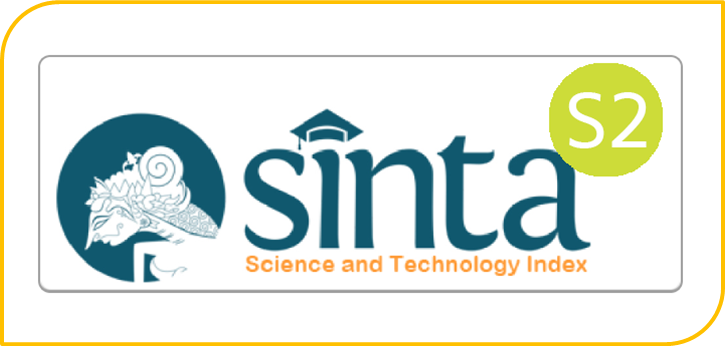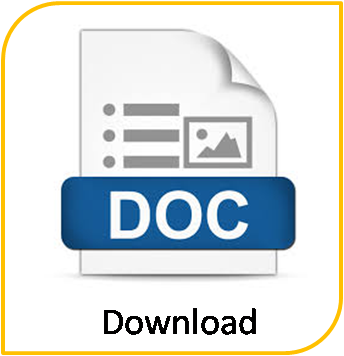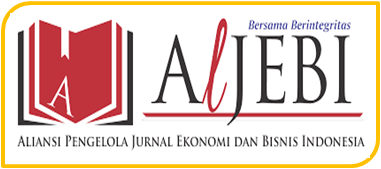Perdagangan Berjangka Komoditi : Berdzikirlah dengan Physical Delivery
Abstract
Commodity Futures Trading in Indonesia is administered by the government under the auspices of the Commodity Futures Trading Supervisory Agency (BAPPEBTI) with the aim of establishing the price of primary commodities (price discovery) and as a hedging facility using futures contracts. However, current futures trading is only a means of speculation caused by its specifications and transaction mechanism.
The application of the three principles of dhikr: the principle of harmony, the principle of integrity, and the principle of one on the quest for hedging solutions in commodity futures will lead to trade where the parties who transact share the risk (risk sharing). Risk sharing can only occur if there is a common goal between buyers and sellers to manage risk (the principle of the one-an). The similarity of objectives will result in a commitment between buyers and sellers to perform physical handover backed by regulation to create a liquid market (the principle of harmony), so that the wholeness of trade mechanisms involving market participants, markets, and regulators will be maintained. The integrity of the role of the stakeholders of commodity trading is what will lead to the solution of the hedge without having to separate the risk with its trading activities (principle of wholeness).
The "dhikr" hedging is a hedge accompanied by the certainty of ownership transfer through physical delivery of physical commodities. Thus, the hedge is not separate from its real trading activity, because the risk is always attached to the profit-making business activity.
Keywords
Full Text:
PDFReferences
Ahmad, Azlin A., Halim, Mustafa A., 2014, The Concept of Hedging in Islamic Financial Transactions, Journal of Asian Social Science, Vol. 10 No. 8.
al-Amine, M., & al-Bashir, M., 2008, Risk Management in Islamic Finance: An Analysis of Derivatives Instruments in Commodity Markets, Pertama. Leidin: Brill’s Arab & Islamic Law Series.
al-Saati, & Hameed, A. R. A., 2002, Sharia Compatible Futures, Journal King Abdulaziz University: Islamic Econ, 15(1), 3-25.
Al-Tabari, 2000, Jami’ Al-Bayan fi Ta’wil Al-Qur’an, Vol. 2, Beirut : Mu’assasah Al Risalah.
An-Nawawi, Riyadhus Shalihin Jilid 1, Penerjemah Achmad Sunarto, (Jakarta: Pustaka Imani, 1999) Cetakan IV.
Anwar, Muhammad, 1990, Islamic economic methodology. Journal of Objectives Studies, 2 (1), 28-46.
Ayub, M., 2007, Understanding Islamic Finance. England: John Wiley & Sons, Ltd.
Bacha, O. I., 2000, Asia’s currency crisis: Between forex market inadequacies and currency vulnerability. In D.N. M. N. Hassan, & M. Musa (Eds.), The Economic and Financial Imperatives of Globalization: An Islamic Response (pp. 41-89). Kuala Lumpur: Institut Kefahaman Islam Malaysia.
Bacha, O. I., 2004, Value preservation through risk management-a shariah compliant proposal for equity risk management. MPRA Research Paper 12632. Germany: University Library & Munich.
Bakar, Osman, 1984, The Question of Methodology in Islamic Science. Muslim Education Quarterly, 2 (1), 16-30.
Borgherts, Donald M, 1996, The Encyclopedia of Philosophy Supplement. New York: Simon & Schuster Macmillan.
Bungin, Burhan, 2012, Analisis Data Penelitian Kualitatif : Pemahaman Filosofis dan Metodologis ke Arah Penguasaan Model Aplikasi, Cetakan ke-8, PT. RajaGrafindo Persada, Jakarta.
Castelino, M.G., 1992, Hedge Effectiveness : Basis Risk and Minimum Variance Hegding, Journal of Futures Markets, vol.12(2), pp.187-201.
Chapra, M. Umer, 1996, What is Islamic economics. Jeddah: IRTI – IDB. Fox, Glen. (1997). Reason and reality in the methodologies of economics. UK: Edward Elgar.
Conrad, C., et al. 1993. Qualitative Research in Higher Education. Needham Heights MA: Giun Press.
Dewan Syariah Nasional MUI dan Bank Indonesia, 2006, Himpunan Fatwa Dewan Syariah Nasional MUI Cet. 3, Jakarta; CV. Gaung Persada.
Djaya, Ashad Kusuma, 2003, Pewaris Ajaran Syekh Siti Jenar : Membuka Pintu Makrifat, Yogyakarta : Kreasi Wacana
Elgari, & Ali, M., 2010, Hedging mechanism in Islamic financial operations, Paper presented to the 7th conference of Shariah Boards of the Islamic Financil Institutions-Auditing Unit for the Islamic Financial Institutions. Jeddah: King Abdul Aziz University.
Ferdiansyah, T, Roy Sembel, 2002, Sekuritas Derivativ, Edisi Pertama, Salemba Empat, Jakarta, Indonesia.
Folinas, D., Manikas, I. and Manos, 2006, B. ,Traceability data management for food chains, British Food Journal, Vol. 108 No. 8, pp 622.
Global Islamic Finance Report, 2010, Global Islamic Finance, Annual Report.
Global Islamic Finance Report, 2010, Islamic derivatives, Theory and Practice, Global Islamic Finance.
Haider Ala Hamoudi, 2007, Muhammad’s Social Justice or Muslim Cant? : Langdelleanism And The Failure Of Islamic Finance, Cornell International Law Journal, 40 Cornell International 89..
Holmes, P., 1995, Ex Ante Hedging Ratio and Hedging Effectiveness of the FTSE-100 Stock Index Futures Contract, Applied Economics Letters, vol.2(3), pp.56-59.
Hull, John C., 2002, Fundamentals of Futures and Options Markets, Prentice Hall Inc., Upper Saddle River, New Jersey.
___________, 2008, Futures, Options, and Other Derivatives, Prentice Hall Inc., Upper Saddle River, New Jersey.
IFSB, 2005, Guiding Principles of Risk Management for Institutions (Other than Insurance Institutions) Offering Only Islamic Financial Services, Exposure, Draft no. 1, www.ifsb.org
Jarrow, R., S. Turnbull, 2000, Derivative Securities, Second Edition, South-Western College Publishing, Ohio, USA.
Kahf, Monzer, 2003, Islamic economics: Notes on definition and methodology. Review of Islamic Economics, 13, 23-47, edition. Herndon, USA: IIIT.
Kamali, Muhammad Hashim, 1989, Source, nature and Objectives of Shari’ah. The Islamic Quarterly, 33 (4), 215-235.
Kamayanti, Ari, 2016, Metodologi Konstruktif Riset Akuntansi : Membumikan Religiositas, Cetakan Pertama, Yayasan Rumah Peneleh, Jakarta.
Karim, Adiwarman, 2003, Bank Islam : Analisis fiqh dan keuangan, Jakarta: IIIT Indonesia.
Khan, M. Fahim, 1997, Islamic Futures and Their Markets, with Special Reference to their Role in Developing Rural Financial Market, Research Paper No. 32, Islamic Research and Training Institute, Islamic Development Bank, Jeddah, Saudi Arabia.
Khan, T., & Ahmed, H., 2001, Risk management: An analysis of issues in Islamic financial industry, Jeddah : Islamic Development Bank. Occasional paper, (5). Retrieved August 2, 2009.
Kolb, R. W., & Overdahl, J. A., 2006, Understanding Futures Markets. Oxford: Blackwell Publishing.
Kolb, Robert W., 2000, Financial Derivatives, New York Institute of Finance, USA.
Laldin, M. A., & Mokhtar, S., 2009, Risk management in Islamic finance. Kertas kerja Seminar Harvard-LSE Workshop on Risk Management. Islamic Economic and Islamic Ethico-Legal Perspectives on the Current Financial Crisis. London School of Economics.
Lindahl, M., 1992, Minimum Variance Hedge Ratios for Stock Index Futures : Durations and Expectation Effects, Journal of Futures Markets, vol.12(1), pp.33-53.
Lindgreen, A. and Hingley, M., 2003, The impact of food safety and animal welfare policies on Supply Chain Management, British Food Journal Vol.105 No.6, pp 328-349.
Lubis, Akhyar Yusuf, 2004, Filsafat Ilmu dan Metodologi Postmodern, Bogor : Akademia.
Lyotard, Jean Francois. 1984, The Postmodern Condition: A. Report on Knowledge, Minneapolis: University of Minnesofa Press. Machlup, Fritz, 1978, Methodology of economics and other social sciences. New York: Academic Press, Inc.
Majah, I., & Al-Qazwini, M. I. Y. (1972). Sunan Ibn Majah. Beirut: Dar al-Jil.
Mardani, 2013, Fiqh Ekonomi Syariah : Fiqh Muamalah, Cetakan Kedua, Kencana Prenadamedia Group, Jakarta, Indonesia.
Mohamad, S., & Ali, T., 2008, Islamic hedging: Gambling or risk management?, Islamic Law and the Law of the Muslim World, 8-47. 21 st Australian Finance and Banking Conference.
Muhadjir, Noeng, 1982, Teori Perubahan Sosial, Yogyakarta : Rake Sarasin.
Muhammad, 2000, Sistem dan Prosedur Operasional Bank Syari’ah, Yogyakarta: UII Press.
Mujib, Abdul, et. al, 1994, Kamus Istilah Fiqh, Jakarta: PT Pustaka Firdaus.
Munawir, Ahmad Wanson, 1997, Al Munawir Kamus Arab-Indonesia, Surabaya: Pustaka Progesif.
Nienhaus, Volker, 1989, Epistemology, Methodology and Economic Policy: Some Thought on Mainstream, Austrian and Islamic Economics. Humanomics, 5 (1), 91-111.
Ningsih, Wiwik F., 2015, Modifikasi Pembiayaan Salam dan Implikasi Perlakuan Akuntansi Salam, Jurnal Akuntansi Universitas Jember Vol. 13 No.2 Desember.
Obiyathullah, B., 1999, Derivative Instruments and Islamic Finance, International Journal of Islamic Financial Services, 1, no. 1.
Omar, Emi N., Jaafar, Harlina S., 2011, Halal Supply Chain in the Food Industry : A Conceptual Framework, IEEE Symposium on Business, Engineering and Industrial Application (ISBEIA), Langkawi, Malaysia.
Omar, Mohd. Azmi, M. Abduh, R. Sukmana, 2012, Fundamentals of Islamic Money and Capital Markets, Wiley Finance Series, Singapore.
Otoritas Jasa Keuangan (OJK), 2014, Siaran Pers : Daftar 262 Investasi Bodong, www.ojk.go.id
Petracci, M., Bianchi, M. and Cavani, C., 2010, Pre-slaughter handling and slaughter factors influencing poultry product quality, Vol. 66, No.5.
Rivai, Harif Amali, 2006, Identifikasi Faktor Penentu Keputusan Konsumen Dalam Memilih Jasa Perbankan : Bank Syariah Vs Bank Konvensional, Jurnal Center For Banking Research Universitas Andalas.
Rokhman, Fatkhur, “Manajemen Risiko dalam Islam” artikel diakses pada 23 Maret 2012 dari http:// xa.yimg.com/kq/groups/24017033/470117059/name/Manajemen.
Ryandono, M. N. H., 2009, Bursa Efek dan Investasi Syariah, Serambi, Yogyakarta, Indonesia.
Sabiq, Sayyid, 1998, Fiqh Sunnah jilid 11, Terjemahan Kamaludin A Marzuki, Bandung: Pustaka.
Seelajaroen, R., 2000, Hedge Ratios and Hedging Effectiveness of the SPI Futures Contract, Working Paper Series in Finance, vol.00-09.
Shihab, M. Q., 2002, Tafsir Al Misbah, Lentera Hati, Jakarta, Indonesia.
Shihab, M. Quraisy, Tafsir Al-Mishbah, (Jakarta: Lentera Hati, 2002), Cet. Ke-V.
Siddiqi, Muhammad Nejatullah, 1981, Restructuring the study of economics in Muslim universities. In Isma’il R. Al-Faruqi and Abdullah Omar Nasseef (eds.), Social and natural sciences: The Islamic perspective (pp. 71-86). Jeddah: King Abdulaziz University.
Siddiqi, Muhammad Nejatullah, 2001, Economics : An Islamic approach. Islamabad : Institute Policy Studies and The Islamic Foundation.
Sudarsono, Heri 2003, Bank dan Lembaga Keuangan Syari’ah, Yogyakarta: Ekonsia.
Suhendi, Hendi, 2002, Fiqh Muamalah, Jakarta: PT Raja Grafindo.
Sutedi, Adrian, 2012, Produk-Produk Derivatif dan Aspek Hukumnya, Penerbit Alfabeta, Bandung.
Suwailem, S., 2006, Hedging in Islamic Finance, Islamic Development Bank, Occasional Paper No. 10.
Talib, Z., Zailani, S. and Zainuddin, Y., 2010, Conceptualization on the Dimensions for Halal Orientation for Foods Manufacturers: A Study in the Context of Malaysia, Pakistan Journal of Social Sciences. Vol. 7 No. 2, pp 56-6.
Tim Pengembangan Perbankan Syari’ah Institut Bankir Indonesia, 2001, Konsep, Produk dan Implementasi Operasional,Jakarta : Djambatun.
Triyuwono, Iwan, 2015, Akuntansi Syariah : Perspektif, Metodologi, dan Teori, Edisi Kedua, Cetakan Keempat, Rajawali Pers, Jakarta.
Umar, Husein, 2001, Manajemen Resiko Bisnis : Pendekatan Analisis Finansial dan Non-Finansial, Gramedia Pustaka Utama, Jakarta, Indonesia.
Umar, M. Abdul Halim, 1995, Shari’ah, Economic and Accounting Framework of Bay Al Salam in the Light of Contemporary Application, Research Paper No. 33, Islamic Research and Training Institute, Islamic Development Bank, Jeddah, Saudi Arabia.
Zahan, M., & Kenett, R. S., 2012, Hedging instruments in conventional and Islamic finance. Journal of Applied Statistical Analysis: Decision Support Systems and Services Evalation EJASA: DSS, 3(1), 59-74.
Zailani, Suhaiza et al, 2009, Halal Traceability and Halal Tracking Systems in Strengthening Halal Food Supply Chain for Food Industry in Malaysia, 18th International Conference Society for Global Business & Economic Development, Bratislava, Slovak Republic, May 27-30.
Zarqa, Muhammmad Anas, 1987, Problem of research in the theory of Islamic economics and suggested solutions. In Problem of research in Islamic economics (pp. 52-63). Jordan: The Royal Academy for Islamic Civilization Research.
Zarqa, Muhammmad Anas, 2003, Islamization of economics: The concept and methodology. Journal of King Abdul Azis University: Islamic Economics, 16 (1), 3-42.
DOI: https://doi.org/10.18860/ed.v5i2.5239
Refbacks
- There are currently no refbacks.
Editorial Office:
Megawati Soekarnoputri Building
Faculty of Economics
E-mail: eldinar@uin-malang.ac.id
Universitas Islam Negeri Maulana Malik Ibrahim Malang
E-ISSN 2622-0083

El Dinar under a CC BY SA 4.0 International License.
Member of:
Indexed By:
















